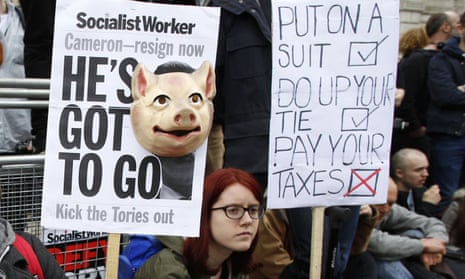Amid the cobbled passageways and tumbling tenements of the Italian city of Perugia, it’s possible to daydream you are in the middle ages. You are surrounded by medieval art and architecture. And then you think: hold on, what happened to the Renaissance?
Sure, there are some imposing private palaces from the period 1300-1500, and sure Raphael left half a fresco in a tiny chapel. But it’s not Florence. The money was clearly here at some point but, some time after 1300, the artistic, cultural and scientific riches moved somewhere else. By 1500, the city was “smaller, poorer and politically narrower” than 200 years before, writes historian Sarah Rubin Blanshei.
Why? Because the rich did not pay their taxes. The Perugian elite became a closed stratum of mafiosi, earning their money from mercenary work abroad, jealously guarding their family inheritance, stifling social mobility. Sound familiar?
As David Cameron’s fiasco over the Panama Papers collides with George Osborne’s over the budget, the danger is that we frame these merely as political scandals.
In fact, the Panama Papers point to a deeper sickness. Globalised capitalism has become an organised and legalised form of corruption, in which the work of the manager, the inventor and the entrepreneur come second to that of people whose wealth “works for them” – preferably in a jurisdiction nobody can see.
If you listen to Cameron’s defenders, their logic follows three contours: he did nothing illegal, nothing unparliamentary and nothing wrong.
I do not doubt his decision to invest in an offshore fund was legal.
That he failed to register his shares in Blairmore on becoming an MP, and lobbied for the protection of offshore trusts while being an undeclared beneficiary of one, does merit investigation by Parliament.
But it’s the insistence by the apopleptic right that he should not be criticised over tax avoidance – that “everybody does it” – that we should register as a kind of collective Marie Antoinette moment for the UK’s social elite.
If someone walked into a pub and announced they had found a way to scam the benefit system, they would face opprobrium or a swift, anonymous call to the benefit cheats hotline.
But a large part of the UK financial industry is dedicated to scamming the rules whereby both individuals and companies pay tax on income. London is home to literally hundreds of advisory companies – many of them registered professionals in finance, accountancy and the law – whose purpose is to do only this.

The size of the missing tax take is disputed. If, as the Tax Justice Network estimates, the global wealth held offshore is $21tn, it might generate $188bn a year for cash-strapped governments.
Why don’t they act? Because, as with the government of Perugia in the mid 1400s, they are stuffed full of people who benefit.
Why doesn’t the populace revolt? Well, the problem with a globalised economy composed of nation states is that you can revolt all you like, beef up national tax systems, even expose the doings of the rich in newspapers ... but as long as the concept of “offshore” exists, so will the legalised corruption.
To the mature democracies of the world, the Panama Papers – as with the Lux Leaks, Swiss Leaks and numerous other data dumps before them – are a warning. If wealth equals power, then the doubling of ratio of wealth to income in the advanced economies since the 70s (see Piketty and Zucman 2014) could tilt power so far in the direction of a new hereditary elite that there is no return.
Last week, Costas Efimeros, the editor of a Greek investigative website, warned that the Panama revelations might be the “last chance” for leak-journalism. If a revelation does not provoke outrage, and the wrongdoers go unpunished, he wrote, “then the continuous revelation of scandals has the exact opposite result: defeatism, the feeling of weakness, the fatalistic acceptance of the rule of the powerful”.
If he is right, there are implications for all of us locked into this scrum around documents, reputations, professional codes and disputed facts.
First, this has to result in action. I am less concerned with taking down an already hapless British prime minister than with empowering him, or his successor, with the will to act unilaterally.
Britain could and should take direct rule of its tax-opaque dependencies. It should abolish non-domicile status. And it should create a taskforce within HMRC specifically designed to prosecute evaders and collect money from the aggressive avoiders.
Second, it has to result in words. I would settle for a prime-ministerial statement to be read out at Oxbridge colleges, public schools and in every bank, law firm and adviser registered with the FSA. It should say: “It’s over. There are no more respectable forms of tax avoidance and from now on offshore wealth will be treated the same way we treat terrorist finance.”
Third, it should be unilateral. The great lesson of the Italian city states in the high Renaissance was that if you will it, it can happen. You can will an economy where science, innovation, art and banking coincide: talented people get rich, inherited wealth soon evaporates; rulers listen to demands for social justice – and if they don’t, they burn.
Acting unilaterally goes against the DNA of the globalised elite. Their “nation” is the global system, and it’s seen as heresy for one country to act without others. “If we do, money will simply move offshore,” is the mantra. “Let it go,” should be the response.
Unilateral action by the UK would be powerful. It would disrupt the system of organised corruption and it would send a signal. We want to enjoy the best of what the next 20 years can offer our population – not the second best after a 1% elite has skimmed off the cream.
We don’t want to be a neo-feudal backwater, where inherited wealth and an unofficial mafia rules. We want to be the Florence, Bruges or Amsterdam of the coming century, not the Perugia.

